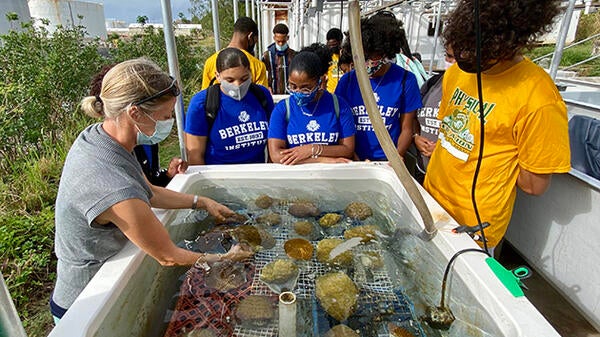A recently awarded grant from the National Science Foundation is set to bring a variety of improvements to the existing outdoor mesocosm facility at BIOS. Originally constructed in 2018 with funding from the Heising-Simons Foundation, International, the mesocosm facility is essentially a large outdoor aquarium comprising four large tanks (400 gallon, or 1,500 liter) and eight small tanks (130 gallon, or 500 liter) housed under a removable canopy. The tanks are located adjacent to a small laboratory trailer, which is used as a staging area and for sample processing.
BIOS Participates in Birdies for Charity Program
August 10, 2021

A unique fundraising program, the Bermuda Championship Birdies for Charity program, was launched earlier this summer benefitting charities on the island of Bermuda. The program will provide up to a 10% match on every donation, with all funds raised going directly to the organizations involved. “Inspired by the program’s tremendous success at other PGA TOUR tournaments, Birdies for Charity will make it possible to expand our reach and offer more opportunities to get involved and make a positive impact for the community,” said Bermuda Championship Executive Director Sean Sovacool.
Big News for the Study of the Ocean’s Smallest Organisms
September 30, 2021
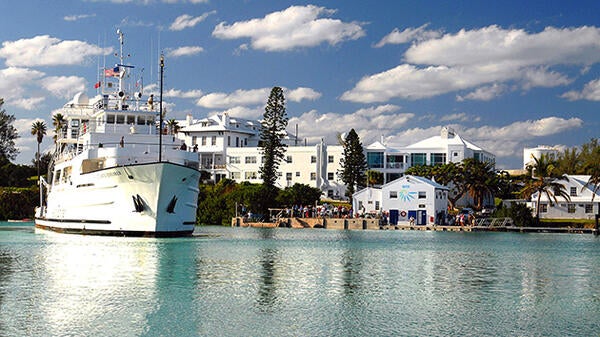
BIOS is one of thirteen academic and research institutions participating in a newly-announced National Science Foundation (NSF) Science and Technology Center (STC) intended to develop a deeper understanding of the role that marine microbes play in changing ocean conditions and the global carbon cycle. Over the next five years, the STC will leverage recent scientific advances, incorporate new technologies, and engage educators and policymakers to promote a deeper understanding of the chemicals and chemical processes that underpin ocean ecosystems.
Missing the Reef for the Corals
September 29, 2021
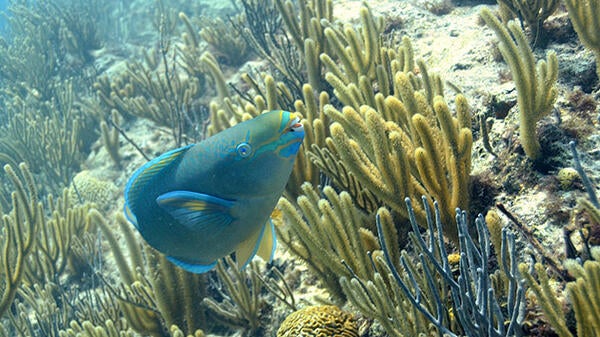
A new study published in the journal Frontiers in Marine Science has uncovered some unexpected trends in the relationship between coral reefs and their environment, contrary to prevailing scientific expectations and understanding. Authors Eric Hochberg, a BIOS reef systems ecologist, and Michelle Gierach, a scientist at NASA’s Jet Propulsion Laboratory (JPL), used readily-available public data for coral cover (the amount of coral in a given reef area) to conduct a meta-analysis, or an analysis of data from different studies. In this analysis, they statistically related reef condition to a suite of biogeophysical forcing parameters (forcings), such as aragonite saturation state (a figure thought to impact the ability of corals to calcify), significant wave height, number of coral species, and various local threats, among others.
Summer of Coral Reef Research at BIOS
September 28, 2021
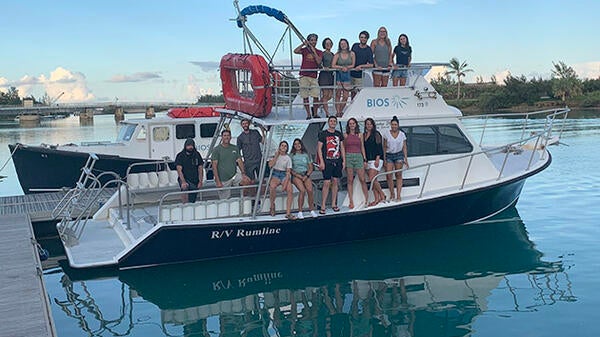
This summer, due to demand from student applicants, BIOS offered two sessions of its Coral Reef Ecology (CRE) course, one that ran from June 28 to July 16 with 13 students, and the other that ran from August 9 to August 27 with 17 students. The courses were co-taught by reef systems ecologist Eric Hochberg and marine benthic ecologist Yvonne Sawall, with teaching assistant (TA) Michael Wooster. Wooster was Hochberg’s National Science Foundation Research Experiences for Undergraduates intern in 2014 and has been a TA for three BIOS summer courses and three fall semester courses.
National Science Foundation Interns Arrive at BIOS
September 27, 2021

In late August, nine undergraduate students from schools across the United States, including Puerto Rico, arrived at BIOS for the 2021 National Science Foundation (NSF) Research Experiences for Undergraduates (REU) internship program. This annual program, which runs for 12 weeks every fall, pairs undergraduate students with BIOS faculty and research staff for independent research projects in a variety of topics in the marine and atmospheric sciences.
A Picture is Worth a Thousand Words
September 26, 2021
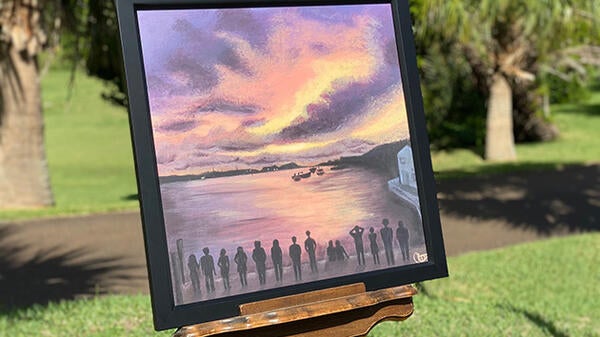
A new painting graces the walls of the BIOS reception building commemorating friendships formed during the Institute’s 2019 National Science Foundation Research Experiences for Undergraduates (REU) internship and fall semester program. Commissioned by REU intern Harvey Castillo, then a biology major at Northern Arizona University (U.S.), and painted by visual artist Claudia Palacios, the piece reproduces a photograph of Castillo and fellow students watching a sunset from the dock at the BIOS waterfront.
Bermuda Institute of Ocean Sciences joins ASU’s Global Futures Lab
October 31, 2021
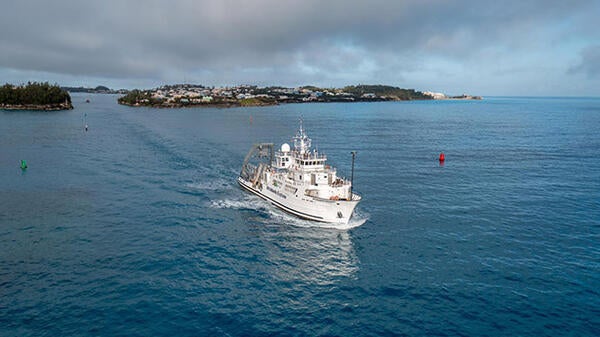
In a major development in the bid to deepen the understanding of the role that the ocean plays in climate science, Arizona State University (ASU) President Michael Crow announced today that ASU, a leading research university, has established a partnership with the Bermuda Institute of Ocean Sciences (BIOS), one of the longest-serving research institutes dedicated to studying ocean processes in the Western Hemisphere.
Good News for Three Long-Term Ocean-Monitoring Programs at BIOS
October 30, 2021
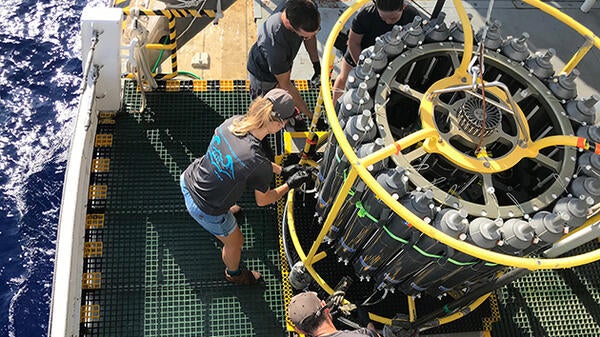
BIOS senior scientist and director of research Nick Bates boosted his research portfolio earlier this month when he received news of three funding renewals for long-term ocean-monitoring programs at BIOS.
BIOS Participates in Career Training Partnership
February 06, 2021
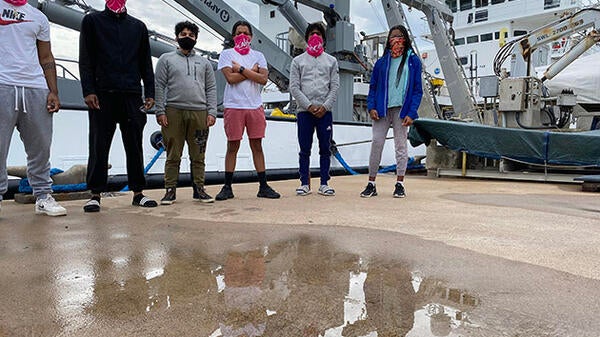
In late January and early February, BIOS education and scientific staff presented two half-days of interactive educational content for 11 young Bermudians as part of an annual collaboration with the Endeavour Maritime Career Springboard Programme. The programme is an intensive, experiential training program for Bermudians ages 16 and older who are interested in working in the maritime industry, which includes careers as diverse as sailing instructors, ferry conductors, shipping and logistics managers, and port operators.
